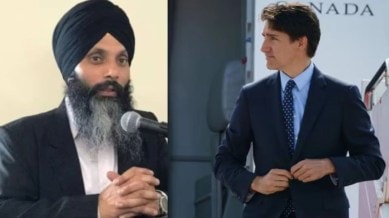Stay updated with the latest - Click here to follow us on Instagram
Canadian Mission: Interference panel not mandated to probe Hardeep Nijjar killing
The report, which runs into seven volumes, was commissioned to look into foreign interference into the Canadian elections and democratic processes, including intra-party elections.

A day after the Canadian report by the Foreign Interference Commission said that there is no definitive foreign link in the disinformation campaign that came after Canadian Prime Minister Justin Trudeau alleged India hand in pro-Khalistan separatist Hardeep Singh Nijjar killing, the Canadian High Commission in New Delhi said on Thursday that the commission was “not mandated to investigate the murder of Nijjar” and “it is up to the courts to decide accountability”.
A Canadian High Commission spokesperson told The Indian Express on Thursday, “PIFI (Public Inquiry into Foreign Interference) was not mandated to investigate the murder of Hardeep Singh Nijjar. The statement in question simply reflects that, ultimately, it is up to the courts to decide accountability with respect to this complex matter, which remains under investigation.”
monthly limit of free stories.
with an Express account.
The report, which runs into seven volumes, was commissioned to look into foreign interference into the Canadian elections and democratic processes, including intra-party elections.
The Ministry of External Affairs Tuesday rejected the probe report by Foreign Interference Commission, identifying India as the “second most active country” (after China) engaging in electoral foreign interference in Canada, and said that in fact, it was Canada which has been consistently interfering in India’s internal affairs.
On the assassination of Hardeep Singh Nijjar on 18 June 2023, the report says that the initial assessment of Canada’s security and intelligence agencies was that this was a gang or criminal activity, and the Prime Minister Trudeau was informed of this. “Over the course of the summer, however, intelligence revealed India’s involvement… The Prime Minister was promptly briefed on the updated assessment”.
“The government wanted India to acknowledge its involvement in the killing but also needed a pragmatic approach to resolve the issue. The Prime Minister testified that the immediate approach was to engage with India and communicate the need for the two countries to work together while ensuring… accountability. Canada also reached out to its allies to ensure a collective and coherent response,” it adds.
On how Canada discussed the issue with India, it says, “A number of meetings took place between the National Security and Intelligence Advisor to the Prime Minister, the CSIS Director, the Deputy Minister of Foreign Affairs and their Indian counterparts in August and September 2023. India did not acknowledge that it was involved in Nijjar’s killing.”
On 18 September 2023, the Globe and Mail published an article saying that Canadian officials had information about potential Indian involvement in Nijjar’s killing. Following this, Trudeau told the House of Commons that security agencies had been actively pursuing credible allegations of a potential link between agents of the Government of India and Nijjar’s death, it adds.
“On 14 October 2024, the RCMP publicly released findings about agents of the Government of India being involved in serious criminal activity in Canada. Simultaneously, GAC (Global Affairs Canada) announced that Canada had expelled six Indian diplomats and consular officials in relation to a targeted campaign against Canadian citizens by agents linked to India. These individuals were identified as persons of interest in the killing of Nijjar.”
Ties between India and Canada have been severely hit after then Canadian Prime Minister Justin Trudeau in September 2023 stated in Parliament that there were “credible allegations” Indian government agents were involved in the killing of pro-Khalistan separatist figure Hardeep Singh Nijjar in June 2023. India rejected the allegations calling them “absurd” and “politically motivated”. It has led to serious downgrading of the relations, as diplomats, including High Commissioners, have been expelled by both countries.